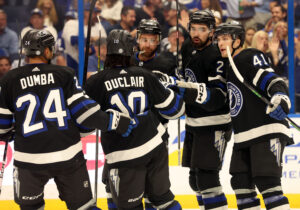Welcome back to Last Word on Hockey’s summer series where we look at the biggest game in team history. Each day we will be back with a new team to look at. Looking at things like the lead-up, what happened, followed, and why it makes it the biggest game. The biggest game does not automatically mean a win, either. Sometimes, it can be a loss that set the franchise back massively. Sit back and enjoy as we break down all 31 teams’ most important game. In this article, we will discuss the Montreal Canadiens biggest game in franchise history. The full series is found here.
Montreal Canadiens Biggest Game in Franchise History
The Montreal Canadiens have countless choices for their biggest game. As the NHL’s most storied franchise, any of their 24 Stanley Cup wins could qualify. Past the Cup, Montreal played participant in many historic events that go beyond the world of hockey. Such as the Richard Riot, or their New Year’s Eve match-up against the Soviet Union in 1975. Their biggest game, however, came in the 1979 semifinals. The Canadiens met the Boston Bruins in penultimate series of the 1979 Stanley Cup Playoffs. The two heavyweights contested a series for the ages that came down to a decisive game 7 that would define the legacy of the 1970s Canadiens and that era of the sport.
A Decade of Dominance
The 1970s were a boom period for the NHL. The league had just expanded to 12 teams and saw some of it’s most unique players and teams enter the fray. The Broad Street Bullies gave hockey a violent edge that intrigued a large audience. Whether you wanted to see the Bullies win or lose, the Flyers brought fans in droves. The Big Bad Bruins dazzled fans with their mixture of violence and the high flying skill of Bobby Orr.
Despite the competitive landscape, the Canadiens dominated the 1970s. Les Habitants could beat any team at their own game with the ability to play both a punishing and high-end skill game. Montreal’s lineup resembled an all-star roster, dotted with some of the greatest players to play the game. When the NHL announced their list of the 100 greatest players in NHL history, 10 of those players suited up for Montreal during the 1970s. The Canadiens would finish the decade capturing six Stanley Cups in 10 years. In addition to their on-ice excellence, the Canadiens were coached by the legendary Scotty Bowman.
Bowman masterfully navigated and guided a locker room full of egos, never allowing the team to be too content. In his seminal hockey book “The Game” Canadiens goaltender Ken Dryden explained the dynamic Bowman brought to the team, saying “On a team of talented, tough-minded, egotistical players, Bowman is the boss…Unmistakably, and to an extent that may surprise even him, Bowman is in charge.”
Collision Course
Leading up to their clash in 1979, the Canadiens and Bruins were intertwined by fate. The Canadiens had won three straight Stanley Cups from 1976-78. The last two of these came against the Boston Bruins in four (’77) and six (’78) games. Though Montreal conquered Boston in two consecutive finals, Montreal’s stranglehold on the league appeared to be fading. For the first time since the 1974-75 season, the Canadiens did not finish the season atop league standings.
Though the Bruins lacked the star power boasted by the Canadiens, they more than made up for it with depth. The previous season the Bruins set a record unlikely to ever be broken when 11 players recorded 20 goals during the season. Boston was still a powerhouse, but they allowed more goals (270) than they ever had under their defensive-minded head coach, Don Cherry.
Despite both teams seeing a downturn on the horizon, they steamrolled their way through the first round of the playoffs. The Canadiens swept the Toronto Maple Leafs, while the Bruins did the same to the Pittsburgh Penguins. The 1979 semifinal series may have been the sunset on Montreal’s dynasty and the Bruins time as being a perennial powerhouse, but the two teams weren’t going to go out with a whimper.
The Series
The Canadiens picked up right where they left off in the previous years’ Stanley Cup Final match-up, beating the Bruins in the first two games. Just as they always had, the Bruins had trouble solving the puzzle of Canadiens goaltender Ken Dryden. Tall goalies are commonplace in today’s NHL, but in 1979 Dryden was a behemoth standing 6’4. Ironically, Dryden presented a problem to the Bruins that they had created. Boston drafted Dryden in 1964 but traded his rights to Montreal after Dryden chose to attend college at Cornell University. In the second game, the Canadiens chased the Bruins goaltender, Hall of Famer Gerry Cheevers, out of the net when he allowed five goals on just 20 shots.
Don Cherry decided to make a permanent change in net, starting Gilles Gilbert for the remainder of the series. The choice paid off in spades as Gilbert and the Bruins won the next two games. From there, Montreal and Boston continued trading wins at home leading to a decisive game 7 in Montreal.
Guy Lafleur proved to be the focal point of the Canadiens attack, recording 9 points in the first six games. The Canadiens cruised to an undefeated record in the series when Lafleur scored a goal.
The Game
Two days before game 7 was played, the Rangers shockingly defeated the top-seeded Islanders to advance to the Stanley Cup. Though the Rangers were formidable, it was unlikely they would beat either the Bruins or the Canadiens. This made game 7 all the more important as the winner would become the heavy favourite to capture the Stanley Cup.
Bruins Jump Out to Early Lead
The Bruins got the best of Montreal in the early goings of the game. Rick Middleton scored a powerplay goal midway through the first period but was quickly answered by Jacques Lemaire. The first period ended tied at one goal apiece. Boston took over in the second period, stunning the Montreal Forum crowd when Wayne Cashman scored 27 seconds into the period. Cashman would once again cash in putting the Bruins up by two goals heading to the third and final frame.
The Canadiens found themselves in a situation they rarely had in the past several years. With their backs against the wall, Canadiens captain Yvan Cournoyer rallied the troops. After the game, Canadiens player Doug Risebrough revealed: “We were down two goals and everybody was pretty quiet, but then Yvan said a few things.”
Canadiens Battle Back
The intermission proved to be a valuable reprieve for the Canadiens as they began pouring shots on the Bruins net. The onslaught paid off when Mark Napier scored six minutes into the third period. A minute later, Boston defender Dick Redmond was called for a hooking infraction, giving the Canadiens an extra attacker. Guy Lapointe quickly converted, tying the game back up.
The Canadiens had yet to lose a game in the Montreal Forum and had all the momentum on their side. Just as it seemed Montreal would overtake the Bruins, Boston hushed the Forum crowd with Rick Middleton‘s second goal of the night.
Shadow
To this day, there are multiple recollections of what exactly happened. Though none are definitive, all reasonable explanations involve Boston’s defensive specialist, Don Marcotte. Known for his gruelling style, the forward became one of Cherry’s go-to players for shutting down the opposing teams’ top offensive player. For his defensive prowess, Canadiens’ legend Guy Lafleur called Marcotte the toughest checker that had ever defended him.
Lafleur had plenty of time to form this opinion, as Marcotte shadowed the forward everywhere he went in the series. As Lafleur went to the bench and then quickly returned as part of a double shift, the lines on the Boston bench entered a confused hysteria. According to many players, Marcotte had rejoined the ice to shadow Lafleur with the other five players taking the ice. Marcotte remembers staying on the bench and the other left-wingers joining the play. However the chaos played out, the shadow Marcotte had so effectively employed resulted in too many men on the ice, and the chance for Montreal’s elite power play to get back in the game.
The Power Play
That season Montreal converted on 28.33% of their power play opportunities in comparison to the league average of 22.72%.
With just minutes to play, the Bruins just had to stop one more onslaught. Bowman used his last opportunity by icing a unit consisting entirely of future Hall of Famers Larry Robinson, Serge Savard, Guy Lafleur, Jacques Lemaire, and Steve Shutt.
The Bruins managed to clear the puck out of the zone where Dryden corralled it to Lafleur. Lafleur carried the puck up the ice before firing it to Lemaire on the right-wing. Lemaire carried the puck to the top of the face-off circle before dropping it back to a trailing Lafleur. Lafleur scorched a shot that beat the Bruins goaltender low to the far side.
Overtime and Aftermath
The Canadiens carried the momentum into the overtime period, out-shooting the Bruins 8-3 in the extra period. 9 minutes into the extra frame, Yvon Lambert scored the dagger that put the Bruins title hopes to rest.
Montreal went on to win the 1979 Stanley Cup, defeating the New York Rangers in five games. The gold standard NHL team wrote one final chapter before the sunset on the Canadiens dynasty. The next year, the upstart New York Islanders usurped Montreal as the best team in the league.
The Bruins fired Don Cherry and entered a new less prosperous phase. Cherry went on to coach the Colorado Rockies for one season before retiring as a coach. He then transitioned into a broadcasting role where he hosted the now-iconic segment “Coaches’ Corner”. In the following years, Cherry would credit the too many men on the ice gaffe for his prolific broadcasting career.
The Canadiens and Bruins spent the entire decade battling for supremacy, with Montreal normally coming out on top. The 1979 semifinal series served as the last gasp for an exciting era in the NHL. Though the Bruins had played worthy adversary, Montreal fittingly defeated their rivals on the way to another Stanley Cup in their biggest game in franchise history.
Main Photo:






